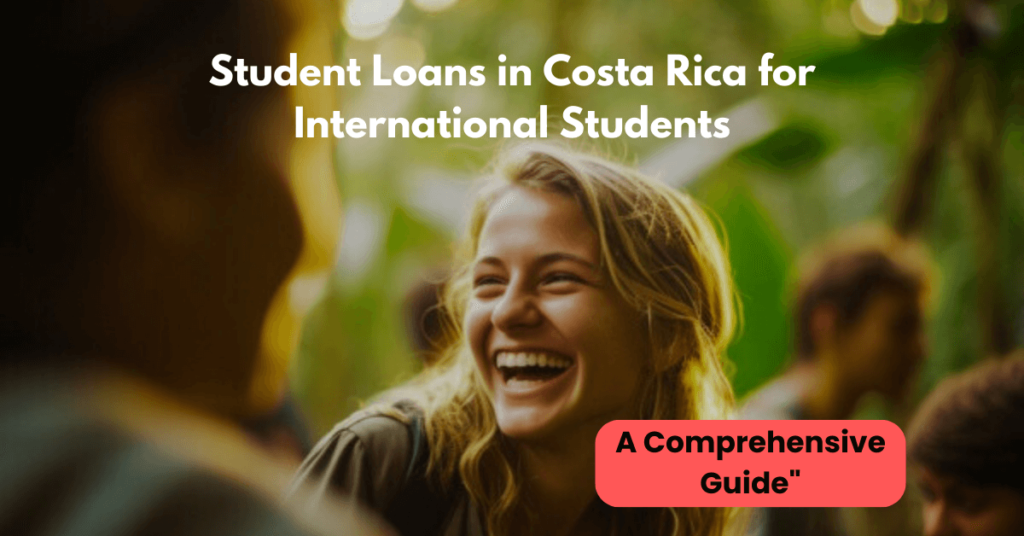“Student Loans in Costa Rica for International Students: A Comprehensive Guide”
Costa Rica is a beautiful and popular destination for international students seeking a unique study experience. Known for its exceptional biodiversity, welcoming culture, and quality education, Costa Rica offers numerous opportunities for those pursuing academic goals. However, the cost of living and tuition fees can present challenges for international students. This raises an important question: Can international students obtain student loans in Costa Rica?
This guide explores the options for student loans in Costa Rica for international students, how to apply, and other financial resources that may help.

The Education Landscape in Costa Rica
Costa Rica boasts a robust higher education system with reputable universities such as the University of Costa Rica (UCR), Costa Rica Institute of Technology (TEC), and EARTH University. While public universities are relatively affordable compared to private institutions, costs can still be significant for international students when factoring in living expenses, travel, and other fees.
Can International Students Get Loans in Costa Rica?
Yes, international students can access student loans in Costa Rica, but the options are more limited compared to other countries. International students may need to explore a combination of local loan providers, international financial aid, or loans from their home countries to cover costs.
Here’s a breakdown of available options:
Types of Student Loans Available in Costa Rica
1. Local Bank Loans
Some Costa Rican banks provide loans for educational purposes, though these are usually geared toward Costa Rican nationals. International students with a strong financial guarantor in Costa Rica may be eligible. Banks like Banco Nacional and Banco de Costa Rica occasionally offer student-specific loans with flexible repayment terms.
2. International Student Loan Providers
Several global financial institutions and lenders cater specifically to international students studying abroad. Organizations like Prodigy Finance and MPOWER Financing may offer student loans for those enrolled in eligible Costa Rican universities. These providers often assess your future earning potential rather than requiring a co-signer or collateral.
3. Home Country Loans
In many cases, international students secure loans from financial institutions in their home countries to fund their education in Costa Rica. These loans often have country-specific terms and may require proof of enrollment and an admission letter.
4. Private Financial Institutions
Private lenders in Costa Rica may offer loans to international students, but these typically come with higher interest rates. Ensure you thoroughly review the terms before committing to a private loan.
How to Apply for a Student Loan in Costa Rica
Applying for a student loan in Costa Rica involves several steps:
- Research Loan Options: Identify banks, international lenders, or organizations that offer student loans to international students. Compare terms, interest rates, and eligibility criteria.
- Prepare Documentation: Gather required documents such as proof of enrollment, passport, visa, academic transcripts, and financial information. Some loans may also require a guarantor or co-signer.
- Submit the Application: Apply online or in person, depending on the lender. Ensure all details are accurate to avoid delays.
- Await Approval: Loan approval times vary, so apply early to secure funding before your semester begins.
Alternatives to Student Loans in Costa Rica
If obtaining a student loan proves challenging, consider these alternatives:
1. Scholarships and Grants
Scholarships are an excellent way to fund your education. Costa Rican universities and international organizations often provide merit-based or need-based scholarships to international students. Explore options such as the Organization of American States (OAS) scholarships or university-specific programs like those at EARTH University.
2. Work Opportunities
Costa Rica allows international students to work part-time while studying, though the rules may vary depending on your visa type. Working on or off-campus can help supplement your income.
3. Family or Personal Savings
If feasible, relying on family support or personal savings can help reduce the need for loans.
4. Crowdfunding
Platforms like GoFundMe or FundMyTravel are creative ways to raise funds for educational purposes. Sharing your story can attract support from friends, family, and even strangers.
Key Considerations for Student Loans in Costa Rica
When exploring student loans in Costa Rica for international students, keep the following in mind:
- Interest Rates: Compare interest rates to ensure you choose an affordable loan.
- Repayment Terms: Understand when repayment begins and whether deferment options are available.
- Co-Signer Requirements: Some loans may require a local co-signer or guarantor.
- Currency Exchange: Consider fluctuations in currency exchange rates if your loan is issued in a different currency.
Tips for Managing Finances as an International Student
- Create a Budget: Outline your expenses and stick to a monthly budget.
- Seek Financial Aid: Apply for scholarships and grants early to maximize your chances.
- Limit Debt: Borrow only what you need to cover essential expenses.
- Build a Support Network: Connect with other international students for tips on saving money and managing finances in Costa Rica.
Final Thoughts
For those wondering about student loans in Costa Rica for international students, options are available, but they require research, planning, and preparation. Whether through local banks, international lenders, or home country loans, students can find ways to finance their education in Costa Rica.
In addition to loans, scholarships, part-time work, and careful financial planning can ease the burden of expenses. With the right strategy, international students can focus on their studies and enjoy the rich cultural and educational experience Costa Rica has to offer.
By exploring all funding avenues and staying informed about financial options, you can turn your dream of studying in Costa Rica into a reality

